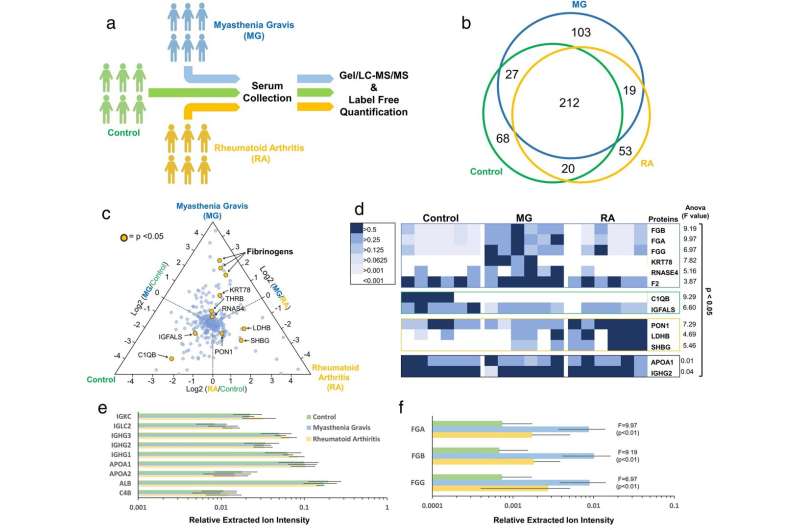This article has been reviewed according to Science X's editorial process and policies. Editors have highlighted the following attributes while ensuring the content's credibility:
fact-checked
peer-reviewed publication
trusted source
proofread
Newly identified biomarker could lead to simple blood test for rare autoimmune disease

A University of Alberta team has uncovered a universal biological marker for myasthenia gravis with the aim of developing a simple, fast and accessible diagnostic test for the rare autoimmune disease.
Affecting 1 in 5,000 people of all ages, but mostly women under 40 or men over 60, myasthenia gravis means "severe muscle weakness." Patients may experience drooping eyelids, double vision, difficulty speaking, chewing, breathing and controlling their limbs, and in rare, severe cases the condition can be fatal.
In recent research published in Scientific Reports, the team used advanced proteomics techniques and discovered blood levels of the protein fibrinogen in myasthenia gravis patients at 1,000 times the level found in both healthy controls and patients who have rheumatoid arthritis, another autoimmune disorder.
"This is a serious disease where you see the patient getting worse in front of your eyes, so we want to have rapid and early diagnosis," says principal investigator and neurologist Zaeem Siddiqi, who treats patients from Alberta and northern Canada.
Current blood tests for the disease assess one of three antibodies and can take several weeks to get results. Depending on the type of disease the tests may be negative in 15% to 50% of patients who have myasthenia gravis but no antibodies. The symptoms of myasthenia gravis can be confused with other neurological conditions such as stroke or multiple sclerosis so, on average, an accurate diagnosis may take up to two years, Siddiqi says.
"We have found a simple and universal biomarker for all types of myasthenia gravis regardless of the stage of the disease, so I hope we can use this methodology to diagnose patients much quicker," says Siddiqi, associate professor in the Department of Medicine.
The researchers examined blood samples of 31 patients with myasthenia gravis, 30 healthy controls and 18 patients with rheumatoid arthritis. They applied several proteomics methods to examine proteins in the blood and found markedly elevated levels of fibrinogen—a protein normally involved with blood clotting—in 100% of the samples from myasthenia gravis patients. They then replicated the findings with other techniques and further confirmed the results using blinded samples.
Siddiqi says the cause of the elevated fibrinogen is unknown but is likely linked to ongoing inflammation, noting that further study is needed to understand the mechanism fully.
Myasthenia gravis is an autoimmune disease in which the immune system attacks its own tissues—in this case, the antibodies attack the junctions where nerves enter muscles. This interrupts the transmission of electrical signals from the nerves to the muscles and leads to muscle weakness.
Treatments aim to suppress that immune misfire. Siddiqi says several new treatments have been developed within the past five years but they are still very expensive. He hopes a streamlined diagnosis process could help patients get effective treatment faster.
Siddiqi's team previously published research using metabolomics that revealed other biomarkers for myasthenia gravis, but those techniques are only available at major medical centers. The new biomarker can be detected with simpler technology that could be used in smaller hospitals and rural centers.
Siddiqi hopes the biomarker may also be useful in future to determine how well patients are responding to treatment. A larger study to confirm the findings and early development of the simpler, more rapid diagnostic test are in the works.
More information: Faraz S. Hussain et al, Residual serum fibrinogen as a universal biomarker for all serotypes of Myasthenia gravis, Scientific Reports (2023). DOI: 10.1038/s41598-023-47559-x


















